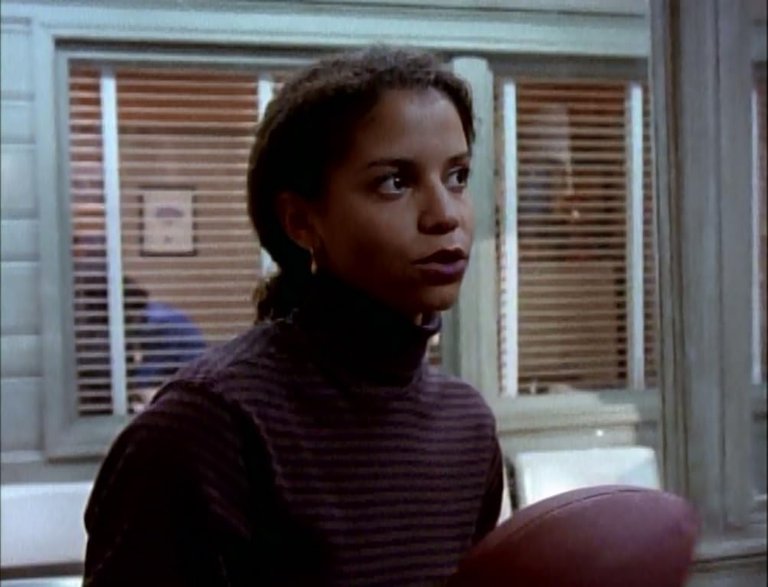Television Review: Dead End (Homicide: Life on the Street, S3X13, 1995)

Dead End (S03E13)
Airdate: 3 February 1995
Written by: Julie Martin & Jorge Zamacona
Directed by: Tim Hunter
Running Time: 46 minutes
Homicide: Life on the Street is a groundbreaking series that diverges from the conventional police procedural formula by eschewing neatly wrapped-up criminal cases within the confines of a single episode. This approach not only enhances the show's realism but also aligns it with the spirit of David Simon's original non-fiction work, which highlighted the often frustrating and chaotic nature of police work in Baltimore's Homicide Unit. Unlike many fictional portrayals where cases are resolved swiftly and efficiently, Homicide presents a more authentic depiction of law enforcement, illustrating that investigations can be convoluted and unresolved. However, this commitment to realism can occasionally backfire when scriptwriters introduce overly dramatic plot twists that feel more akin to soap operas or Hollywood thrillers. The episode Dead End, which serves as the second part of a three-episode arc in Season 3, exemplifies this tension between authenticity and melodrama.
The plot of "Dead End" picks up from the previous episode, where a seemingly routine child murder case spiraled into chaos following an ambush that left three members of the Homicide Unit gravely injured. As Detective Felton slowly recuperates in hospital, Bolander and Howard continue their fight for survival. Lead investigator Pembleton finally receives a breakthrough in his pursuit of the suspected shooter, Glenn Holton, portrayed by Steve Hofvendahl. Pembleton's investigation is bolstered by information from Holton's friend, Manuel (played by John Ventimiglia), and Holton’s girlfriend, Alice (played by Theresa Payne-Rohan). Upon Holton's apprehension and subsequent interrogation in "the Box," one would expect Pembleton's renowned skills to elicit a confession regarding the shooting of three officers. However, despite the dire implications of his actions, Holton falters in providing critical details, leading Pembleton to a heart-wrenching realisation: Holton was not present during the shooting. This revelation suggests that a more cunning and dangerous individual remains at large.
The aftermath of the ambush also unfolds throughout this episode, particularly through Russert's reluctant involvement in investigating Giardello's potential mishandling of the arrest warrant that precipitated the shooting. Although Russert grapples with her duty to her superiors and her desire to protect Giardello’s career, her internal conflict highlights the moral complexities faced by those in law enforcement. Meanwhile, Felton's recovery prompts him to reassess his life priorities; he decides to end his marriage with Beth and attempts to rekindle his relationship with Russert.
In terms of plot progression, Dead End initially presents itself as a realistic portrayal of a high-profile case—often referred to by fans as a “Red Ball” case—stemming from an unfortunate clerical error. Yet as the episode unfolds, it becomes evident that this narrative is set for a dramatic twist. Just as Holton is apprehended and the case appears ready for resolution, it becomes clear that he lacks the requisite skills or inclination to confront armed police officers directly. The introduction of an even more sinister antagonist—one who presumably will be unveiled in the trilogy’s conclusion—feels somewhat predictable and detracts from the otherwise grounded storytelling.
Despite these narrative misgivings, Dead End excels due to its exceptional performances from both lead and supporting cast members. John Ventimiglia, who would later earn fame as Artie in The Sopranos, delivers a compelling performance as Manuel, while Gloria Reuben’s guest role as Detective Walters hints at potential for greater involvement within the series—a prospect that ultimately did not materialise. Conversely, Daniel Baldwin shines as Felton despite being bedridden; his performance culminates in an optimistic moment when Howard awakens from her coma, providing a glimmer of hope amidst the darkness.
Dead End serves as a microcosm of Homicide: Life on the Street's broader themes: the messy reality of police work juxtaposed with personal struggles and systemic challenges within law enforcement. While it occasionally falters under the weight of its own melodrama—particularly with its reliance on predictable plot twists—the episode remains engaging thanks largely to its strong characterisation and performances.
RATING: 6/10 (++)
Blog in Croatian https://draxblog.com
Blog in English https://draxreview.wordpress.com/
InLeo blog https://inleo.io/@drax.leo
Hiveonboard: https://hiveonboard.com?ref=drax
Rising Star game: https://www.risingstargame.com?referrer=drax
1Inch: https://1inch.exchange/#/r/0x83823d8CCB74F828148258BB4457642124b1328e
BTC donations: 1EWxiMiP6iiG9rger3NuUSd6HByaxQWafG
ETH donations: 0xB305F144323b99e6f8b1d66f5D7DE78B498C32A7
BCH donations: qpvxw0jax79lhmvlgcldkzpqanf03r9cjv8y6gtmk9
Posted Using INLEO